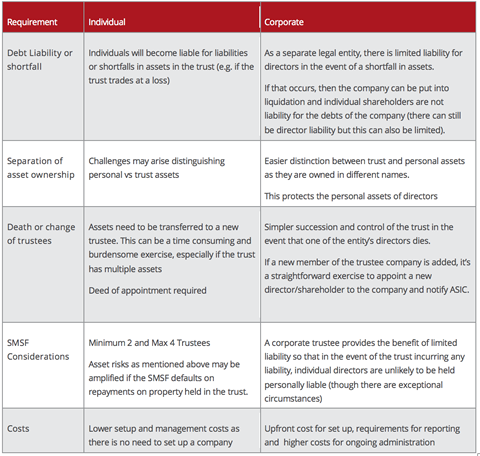Discretionary Trusts: Individual vs Corporate Trustee

Discretionary trusts provide a lot of benefits from a tax perspective but should you appoint an Individual or a Corporate Trustee?
Discretionary trusts provide a valuable vehicle for managing assets in a legal structure such as a family office, SMSF, or business, allowing income to be distributed to beneficiaries in a flexible, tax-effective way. We are often asked about the differences between the appointing an individual vs. corporate trustee when we set up entities for our clients and whether a corporate trustee is worth the up-front and management costs.
The key difference between individual trustees and corporate trustees is how much exposure you are willing to have to risk and responsibility for potential liabilities within the trust, as well as the flexibility afforded for changes in the trust. Whilst a corporate trustee may incur higher up front and management costs, our view is that the benefits and protection it offers to members of the trust are worth considering.
What is a discretionary trust?
A trust is the relationship between the legal owner of property and other assets and the beneficial owners of the property and assets of the trust (i.e. the beneficiaries).
In a discretionary trust, the trustee has flexibility on how to distribute income and capital to beneficiaries, which must be documented and governed by terms of the trust deed. As a trustee is the legal owner of all assets held in a discretionary trust, its name must appear on all legal documents. The trustee is also responsible for managing the day-to-day affairs of the trust.
Why use a discretionary trust?
Discretionary trusts have a number of advantages, for example:
- Flexibility: Trustees can determine how income and capital are distributed to beneficiaries. This can change from year to year. The capital gains discount can also pass through trusts to individual beneficiaries.
- Tax effectiveness: Tax minimisation is possible as income from the trust can be distributed to beneficiaries on lower marginal tax rates and therefore reducing the amount of tax paid by beneficiaries.
- Asset Protection: Assets in a trust are protected from creditors and provide the ability to control assets across generations (provided you have a corporate trustee).
- Investment structure: A discretionary trust can be an appropriate structure for investments and trading, for example, as a business.
Deciding on a trustee: Should you have an individual or corporate trustee?
Some trusts opt for individual trustees due to the lower up-front costs and management costs over time, however, the primary benefit of a corporate trustee is asset protection.
If the trust is likely to be exposed to investment, business, or other types of risk, considering how to protect both members and the trust’s assets held becomes more important. The table right shows some of the key differences for individual vs. corporate trustees:

Talk to your accountant
In weighing up the pros and cons of individual trustees versus corporate trustees, an accountant can help you to look at both options in the context of your current circumstances, risks, estate planning, tax, and superannuation.
Last updated May 2017. This factsheet is provided for information purposes only and is correct at the time of publishing. It should not be used in place of advice from your accountant. Please contact us on 02 9957 4033 to discuss your specific circumstances.